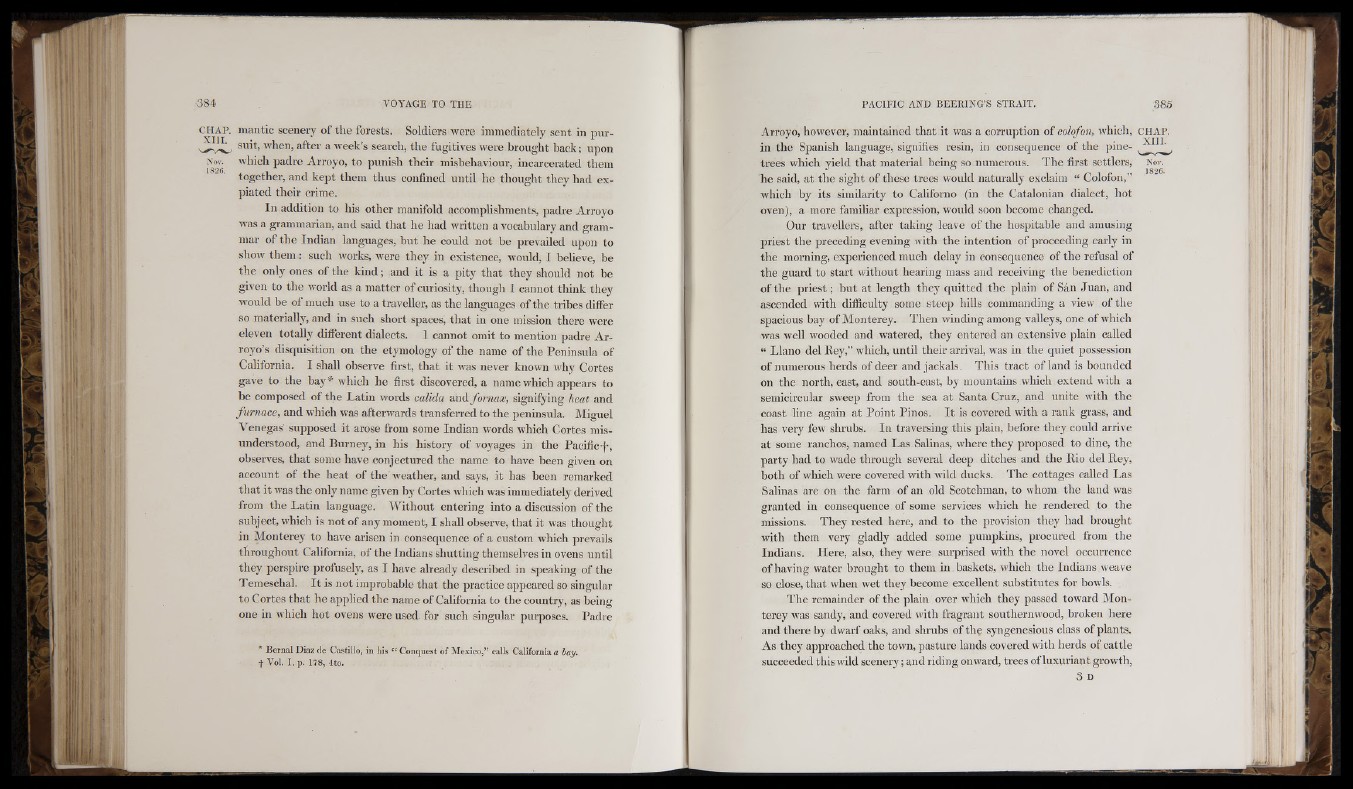
Ri’
C H A P .
X I I I .
Nov.
18 26.
mantic scenery of the forests. Soldiers were immediately sent in pursuit,
when, after a week’s search, the fugitives were brought back; upon
which padre Arroyo, to punish their misbehaviour, incarcerated them
together, and kept them thus confined until he thought they had expiated
their crime.
In addition to his other manifold accomplishments, padre Arroyo
was a grammarian, and said that he had written a vocabulary and grammar
of the Indian languages, but he could not be prevailed npon to
show them : such works, were they in existence, would, 1 believe, be
the only ones of the kind; and it is a pity that they should not be
given to the world as a matter of curiosity, though 1 cannot think they
ivould be of much use to a traveller, as the languages of the tribes differ
so materially, and in such short spaces, that in one mission there were
eleven totally different dialects. 1 cannot omit to mention padre Arroyo’s
disquisition on the etymology of the name of the Peninsula of
California. I shall observe first, that it was never known why Cortes
gave to the bay* which he first discovered, a name which appears to
be composed of the Latin words calida and fornax, signifying heat and
furnace, and which was afterwards transferred to the peninsula. Miguel
Venegas supposed it arose from some Indian words which Cortes misunderstood,
and Burney, in his history of voyages in the Pacific-f-,
observes, that some have conjectured the name to have been given on
account of the heat of the weather, and says, it has been remarked
that it was the only name given by Cortes which was immediately derived
from the Latin language. AVithout entering into a discussion of the
subject, which is not of any moment, I shall observe, that it was thought
in Monterey to have arisen in consequence of a custom which prevails
throughout California, of the Indians shutting themselves in ovens until
they perspire profusely, as I have already described in speaking of the
Temeschal. It is not improbable that the practice appeared so singular
to Cortes that he applied the name of California to the country, as being
one in which hot ovens were used, for such singular purposes. Padre
’ B ern a l Diaz de Castillo, in his “ C onquest of Mexico,” calls California a bay.
t Vol. I. p. 178, 4to.
.ill
Arroyo, however, maintained that it was a corruption of colofon, w'hich, C H A P .
in the Spanish language, signifies resin, in consequence of the pine- 7 1 7
trees which yield that material being so numerous. The first settlers,
N ov.
he said, at the sight of these trees would naturally exclaim “ Colofon,”
1826.
which by its similarity to Californo (in the Catalonian dialect, hot
oven), a more familiar expression, would soon become changed.
Our travellers, after taking leave of the hospitable and amusing
priest the preceding evening with the intention of proceeding early in
the morning, experienced much delay in consequence of the refusal of
the guard to start without hearing mass and receiving the benediction
of the priest; but at length they quitted the plain of Sán Juan, and
ascended w'ith difficulty some steep hills commanding a view of the
spacious bay of Monterey. Then winding among valleys, one of which
was well wooded and watered, they entered an extensive plain called
“ Llano del Eey,” which, until their arrival, was in the quiet possession
of numerous herds of deer and jackals. This tract of land is bounded
on the north, east, and south-east, by mountains which extend with a
semicircular sweep from the sea at Santa Cruz, and unite with the
coast line again at Point Pinos. It is covered with a rank grass, and
has very few shrubs. In traversing this plain, before they could arrive
at some ranchos, named Las Salinas, where they proposed to dine, the
party had to wade through several deep ditches and the Rio del Rey,
both of which were covered with wild ducks. The cottages called Las
Salinas are on the farm of an old Scotchman, to whom the land w'as
granted in consequence of some services which he rendered to the
missions. They rested here, and to the provision they had brought
W'ith them very gladly added some pumpkins, procured from the
Indians. Here, also, they were surprised w'ith the novel occurrence
of having water brought to them in baskets, which the Indians weave
so close, that when wet they become excellent substitutes for bow'ls.
The remainder of the plain over which they passed toward Monterey
W'as sandy, and covered with fragrant southernwood, broken here
and there by dwarf oaks, and shrubs of the syngenesious class of plants.
As they approached the town, pasture lands covered w'ith herds of cattle
succeeded this wild scenery; and riding onward, trees of luxuriant growth,
3 u
i i